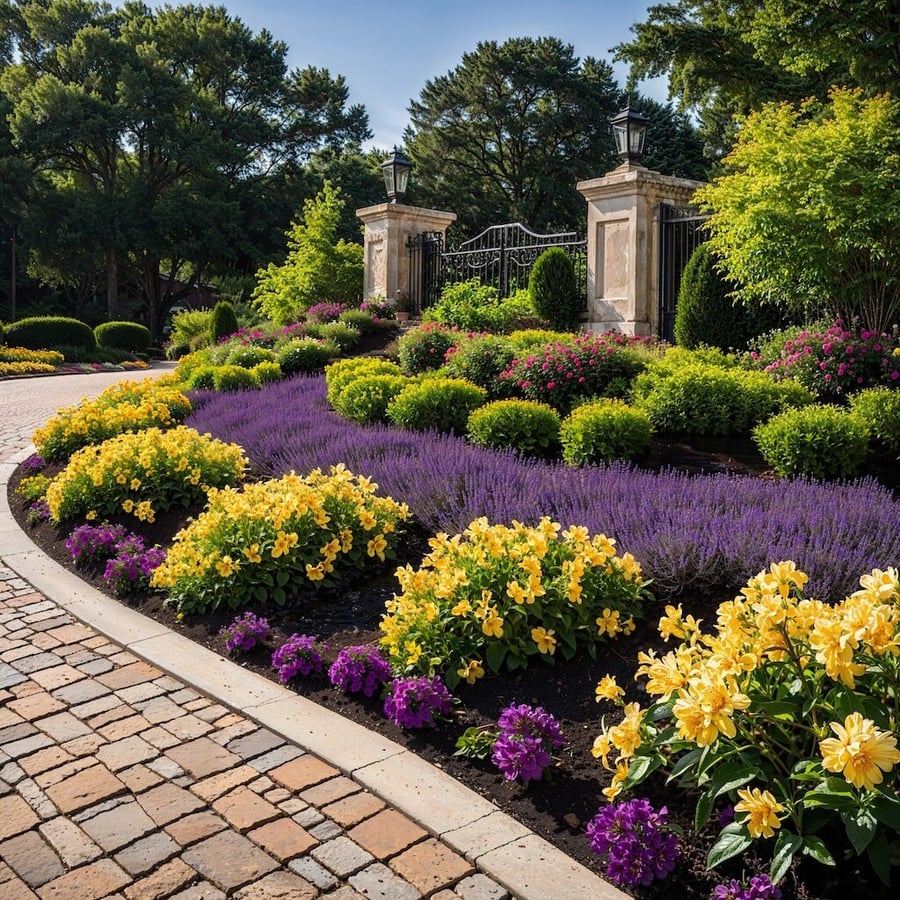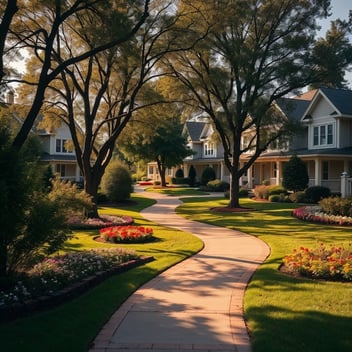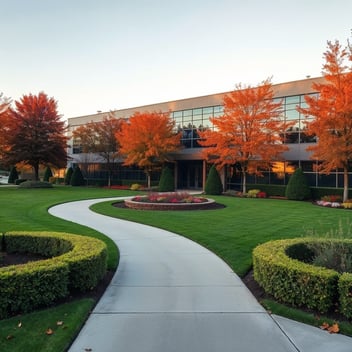Year-Round Color Programs for HOAs: Enhance Community Beauty

As a landscape designer who's spent over two decades transforming HOA communities across Long Island, I've learned that a well-executed seasonal color program is more than just planting pretty flowers – it's about creating a living, breathing canvas that enhances property values and brings joy to residents year-round. Let me share some insider knowledge that will help your HOA make informed decisions about seasonal color programming.
Understanding Seasonal Color Programs: The Foundation of Community Beauty
A seasonal color program is a strategic approach to maintaining vibrant, eye-catching landscapes throughout the year. Trust me, I've seen firsthand how a thoughtfully planned program can transform a mundane entrance into a memorable welcome statement. The key is understanding that different plants thrive in different seasons, and planning accordingly.
Core Components of a Successful HOA Color Program
From my experience working with numerous HOA communities, successful seasonal color programs typically include:
- Rotating Flower Displays: Strategic placement and timing of seasonal blooms
- Permanent Foundation Plantings: Year-round structure and greenery
- Container Gardens: Flexible, high-impact color spots
- Native Plant Integration: Sustainable, low-maintenance options
Season-by-Season Planning: Your Year-Round Color Guide
Spring (March-May): Setting the Stage
After the long winter months, your community deserves a burst of color. Here's a trick I learned years ago: layer your spring bulbs when planting in fall. Plant later-blooming bulbs above earlier ones for a continuous show from late winter through spring.
Recommended Spring Selections:
- Early Spring: Crocuses, Snowdrops, Early Daffodils
- Mid-Spring: Tulips, Hyacinths, Late Daffodils
- Late Spring: Alliums, Late Tulips, Bleeding Hearts
Summer (June-August): Peak Impact Season
Summer is when your color program really shines. Want to know a landscaper's secret? Group plants with similar water needs together to maximize irrigation efficiency while maintaining stunning displays.
Summer Standout Selections:
- Full Sun Areas: Petunias, Salvias, Lantanas
- Partial Shade: Coleus, Begonias, Caladiums
- Heat-Tolerant Options: Zinnias, Portulaca, Verbena
Fall (September-November): Embracing Autumn's Palette
Here's a fun trick I learned the hard way: don't wait until fall to plan your autumn display. Order fall plants by mid-summer to ensure availability of premium varieties.
Fall Color Champions:
- Early Fall: Mums, Asters, Ornamental Cabbage
- Mid-Fall: Pansies, Violas, Ornamental Grasses
- Late Fall: Winterberries, Late-blooming Asters
Winter (December-February): Maintaining Interest
Winter doesn't mean your community has to look dormant. I've helped many HOAs create winter interest through strategic planning and plant selection.
Winter Interest Elements:
- Evergreen Foundation Plants
- Plants with Colorful Berries
- Architectural Elements and Container Displays
Budget Considerations and ROI
Let's talk money – because that's what HOA boards need to consider. A well-planned seasonal color program is an investment in your community's property values. Here's how to make it work:
Cost-Effective Strategies
- Bulk Purchasing: Order plants in quantity for better pricing
- Native Plant Integration: Reduce maintenance and replacement costs
- Strategic Plant Selection: Choose varieties with longer blooming periods
- Professional Installation: Ensure proper planting for optimal plant health
Maintenance Requirements and Best Practices
Think of your seasonal color program as nature's carpet – it needs regular care to look its best. Here's what a comprehensive maintenance plan should include:
Daily/Weekly Tasks
- Deadheading spent blooms
- Monitoring irrigation needs
- Checking for pest issues
- Removing debris and weeds
Monthly/Seasonal Tasks
- Fertilization scheduling
- Plant rotation planning
- Soil amendment assessment
- Disease prevention measures
Sustainable Practices in Seasonal Color Programs
Let's turn that boring approach to sustainability into your community's eco-friendly paradise! Here's how we can make your color program both beautiful and environmentally responsible:
Water Conservation Strategies
- Smart irrigation systems
- Drought-resistant plant selection
- Mulching techniques
- Rainfall monitoring
Community Engagement and Education
The most successful HOA color programs I've implemented always involved community buy-in. Here's how to get residents excited about your seasonal displays:
Engagement Strategies
- Regular updates in community newsletters
- Educational workshops for residents
- Community planting events
- Photo contests featuring seasonal displays
Working with Professional Landscapers
A successful seasonal color program requires expertise and dedication. When selecting a landscaping partner, look for:
- Proven HOA experience
- Professional certifications
- Comprehensive service offerings
- Strong communication practices
Planning for Long-Term Success
Your seasonal color program should evolve with your community. Consider these factors for long-term success:
- Climate change adaptation
- Changing community demographics
- Property value trends
- Maintenance cost optimization
Taking the Next Step
Ready to elevate your community's appearance with a professional seasonal color program? Start by conducting a thorough assessment of your current landscaping situation and community needs. Consider consulting with professional landscaping services that specialize in HOA and community landscaping.
For more insights on enhancing your community's outdoor spaces, explore our guides on HOA landscaping guidelines and regulations and comprehensive HOA community landscaping services.



